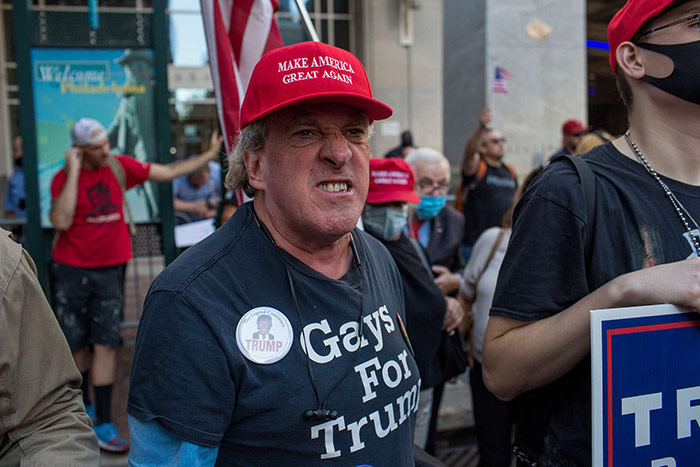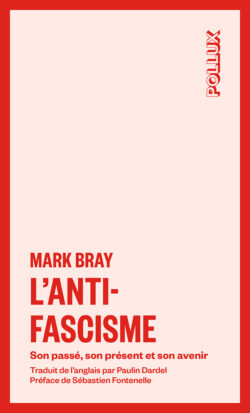Sous-total: $

Trump’s Baseless Fraud Accusations Are Already Sparking Far Right Violence
On Saturday, the media declared victory for now President-elect Joe Biden. Staying true to form, Donald Trump is following through on his promises to reject defeat by declaring fraud. The two-and-a-half months between now and Inauguration Day will undoubtedly be filled with tension as we watch to see whether Republican leaders and/or state forces will take steps beyond echoing Trump’s rhetoric of fraud to tangibly ensure that their leader holds on to power.
Far more likely than a pro-Trump military-backed coup, however, is enhanced militancy on the part of far right militias and fascist groups. Already Trump’s unfounded accusations of fraud have inspired an attempted armed attack on the Philadelphia convention center and bomb threats against the mall next to the convention center, not to mention the plot to kidnap the governor of Michigan. Indeed, Trump’s ramblings about election fraud — which he has peddled for four years now — fit perfectly into the conspiratorial worldview of QAnon and provide ample fodder for far right efforts to expand their popular support and undermine faith in the electoral system. As Spencer Sunshine points out, however, recently the “white nationalist wing of the ‘alt right’… continues to implode” with the dissolution of the American Identity Movement (formerly Identity Evropa) and other developments.
Nevertheless, there is still much cause for long-term concern. To a limited extent, the emergence of this revanchist Trumpian myth of betrayal at the ballot box is reminiscent of the Dolchstoßlegende (or stab-in-the-back myth) that emerged in right-wing circles after the German defeat in World War I in 1918. Unable to fathom that the war effort was failing, the German right argued that it was not military defeat but rather the treacherous actions of politicians, socialists, trade unionists and especially Jews that sealed their fate. There were, of course, myriad factors that made conditions a century ago very different from those of today, and a sequel to the major results of the stab-in-the-back myth — i.e., the rise of Hitler and the Holocaust — is very unlikely. Nevertheless, the racialized discrediting of the election, evident in how Trump, Tucker Carlson, and others singled out cities like Detroit and Philadelphia, situated within a larger antisemitic far right ecosphere that accuses Jews like George Soros of being the puppet masters controlling Black resistance, bears resemblance to earlier antisemitism. At the very least, over the coming years this emerging mythology of deceitful election fraud will further polarize much of the right and erode faith in the republic.
So while figures like Jon Meacham may argue that Biden’s victory is the “beginning of the end of an era of perpetual partisan warfare,” it is more likely that this is the end of the beginning of an era of social strife as this country continues to grapple with its genocidal and white supremacist history. Although the demographic foundation of Trumpism will continue to shrink as the United States becomes less white, a corresponding accentuation of the erroneous perception of white victimhood on the part of more and more conservatives may make the threat of the far right grow in size and in its level of violence. If they believe that the 2020 election was stolen, many conservatives may feel like the “democracy” that they thought they loved is not loving them back. And so perhaps, from their twisted perspective, another American Revolution may be necessary to rescue the country from what they see as internal enemies.
While the increasing percentage of nonwhite people in the United States appears to provide a roadblock on the potential path to power of a white nationalist leader, it is possible to imagine the emergence of a more cunning, calculated version of Trump who could pull from a broader base of support, particularly in a time of acute crisis. In that sense, although the future is unknown, perhaps Zeynep Tufekci is right to warn that “America’s next authoritarian will be much more competent.”
Unfortunately, many liberals are unable to envision strategies of opposition to such a figure that go beyond electoral politics. Certainly this has changed somewhat over the past year as thousands of people have taken to the streets in Black Lives Matter protests and other mobilizations. Overall, however, for many liberals, particularly many white liberals, #TheResistance amounted to little more than desperately following the Mueller investigation (and even lionizing people like former FBI Director James Comey) as Trump’s administration rolled on. Fortunately for them, Biden won. If he had not, they may have been forced to countenance the limitations of their political horizons. Such a reckoning may come nevertheless if sufficient support develops for Trump to remain in the White House. But even if the end of Trump’s reign is uneventful, they may not get such a reprieve in the future.
A mainstream narrative accompanying the defeat of Trump says that a hateful aberration in the history of our political system is over, and that bigotry and misogyny have been banished from the White House, despite Biden’s racist and sexually abusive history and the structurally white supremacist nature of our entire system. This shows how there is a mobilizing and a demobilizing dynamic at play with the result of the election. While Trump’s defeat will energize many to push further in their pursuit of justice, Biden’s victory will also have a “brunch” effect: As an infamous protest sign claimed, “If Hillary was president we’d all be at brunch.” With Biden in office, how many will (metaphorically) trade in their molotovs for mimosas? And how can we work to ensure that those newly activated people who mobilized against Trump continue to actively push back against the forces that spurred on his presidency?
In politics as in life, not all steps forward are without their challenges and complications. Specifically in terms of resistance to a potentially energized and even more dangerous far right, we must recognize how there can be a kind of symbiosis between the far right and the political center (when the far right is not powerful enough to destroy all opposition). The more threatening the right-wing threat, the more leftists will strategically support the centrist opposition to stave off complete catastrophe. Meanwhile, the far right infiltrates the liberal rhetoric of diversity, inclusion and tolerance to gain access to popular political discourse and cast leftist anti-fascist initiatives as “intolerant” and unjust. Even when the right-wing threat fails, the effect that the far right often has in pulling their opposition to the center means that the status quo remains more favorable to their outlook than it would have been otherwise. Hillary Clinton articulated this symbiosis when she counseled European leaders to clamp down on immigration in order to deprive the far right of one of its animating political issues. House Majority Whip Jim Clyburn (D-South Carolina) cautioned regarding the Georgia runoff elections, “if we are going to run on Medicare for All, defund the police, socialized medicine, we’re not going to win.”
How do those of us whose political aspirations do not fit in the Biden-Harris White House push back against the centrist assumption that radicalism gives increased propagandistic fodder for the enemy?
To some extent such debates boil down to the classic struggle that radical organizers face in attempting to balance “meeting people where they’re at” politically and attempting to advance the agenda in a leftward direction. But particularly in the broader context of an anti-fascist struggle, how do those of us whose political aspirations do not fit in the Biden-Harris White House push back against the centrist assumption that radicalism gives increased propagandistic fodder for the enemy? While there are no easy answers, moving forward we must capitalize as best we can on the vindicated energy of anti-Trumpism and the powerful social movements of recent years. We must build enough popular power from below to prevent our resistance from being funneled into the political center as we defeat the next would-be racist authoritarian demagogue.
Mark Bray is a historian of human rights, terrorism and politics in modern Europe. He is the author of Antifa: The Anti-Fascist Handbook, Translating Anarchy: The Anarchism of Occupy Wall Street, and the co-editor of Anarchist Education and the Modern School: A Francisco Ferrer Reader.
Mark Bray, auteur de L’antifascisme, Truthout, 9 novembre 2020
Photo: As Philadelphians celebrated in the streets after the presidential election was called for Joe Biden, a small gathering of Trump supporters protested, falsely claiming the election was stolen, on November 7, 2020, in Philadelphia, Pennsylvania. Andrew Lichtenstein / Corbis via Getty Images
Lisez l’original ici.
 Mon compte
Mon compte






